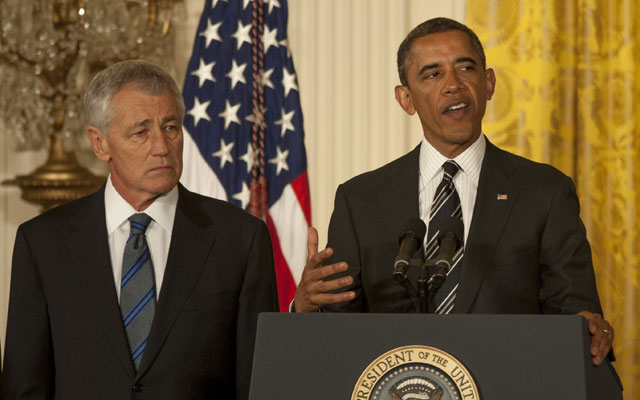Chuck Hagel’s Military Service – Is It the Game-Changer?
Steven Bucci /
President Obama’s Chief of Staff Denis McDonough recently said of former-Senator Chuck Hagel (R–NE), “I think he’ll be a great Defense Secretary. This is a guy who volunteered to go to Vietnam…heavily decorated when he was there, well performing when he was there, and everything since.”
Members of the U.S. Senate, policy world, and media have made serious arguments against Hagel as a candidate for Secretary of Defense. His military service, a popular defense of Hagel’s nomination, is not a legitimate counter to those concerns. In fact, it is the one shield Hagel’s supporters throw up at any question of his qualifications, claiming it to be an unassailable prima fascia argument. Yet it takes more than just military combat service to make a competent Secretary of Defense.
Hagel served honorably and bravely in combat, but at his highest rank, he was a young sergeant. This is a key role, on which the Army builds its formidable capability, but it must be said, that this is the lowest non-commissioned officer rank in the Army. He was a fire team leader (who leads 4–5 men) or at most a squad leader (who leads 10–12 men). This is certainly something to be proud of, but hundreds of thousands of men and women have served in combat between Vietnam, Grenada, Lebanon, Desert Storm, Iraq, and Afghanistan (as well as other areas never named or acknowledged), but that alone does not make them ready to run the Department of Defense (DOD).
The DOD employs millions of men and women, and operates an astronomical budget. How can anyone say with certainty that a man with little leadership experience beyond his military service 40 years ago is qualified to lead and manage such an organization? The answer is clear—no one.
This further discredits some of the great Secretaries of Defense who have no military experience. Donald Rumsfeld, never saw combat as a Navy Captain, but gained valuable leadership experience as a businessman as well as Member of Congress for years. Robert Gates was an Air Force junior officer who also didn’t see combat, but he did lead the Central Intelligence Agency (CIA) prior to his nomination as Secretary of Defense. Leon Panetta has no military experience, but ran the Office of Management and Budget, was the White House Chief of Staff, and ran the CIA before managing the Pentagon. None of these men have combat experience, yet all were capable Secretaries with previous experiences of significant leadership and management. These are critical skills not necessarily acquired in Vietnam.
Hagel deserves credit for his brave service in Vietnam. However, this does not in and of itself make him suitable to be the Secretary of Defense of the United States. American veterans all thank Hagel for having fought, but most of us also recognize that being in charge of the world’s greatest military requires something more.
Many Senators recognize this and have not supported Hagel’s nomination. There is not enough evidence that even in a time of peace he will effectively run the U.S. military. Giving him this role when the nation still faces a dangerous and hostile world is a manifestly bad idea.
Steven P. Bucci, director of Heritage’s Douglas and Sarah Allison Center for Foreign Policy Studies, served America for three decades as an Army Special Forces officer and top Pentagon official.

